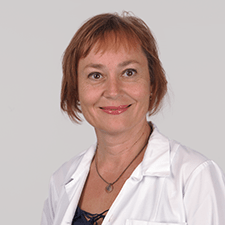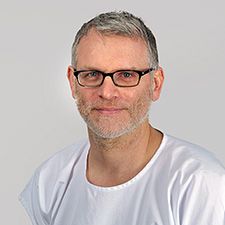What is a thyroid scintigraphy?
A thyroid scintigraphy is indicated in several disease states. Usually the patient examined suffers from a nodular goiter or a thyroid producing too much thyroid hormone. After the injection of a small dose of radioactivity, a scanner able to detect it, will be placed over you and images are obtained. In general, we perform a thyroid ultrasonography in addition to the thyroid scintigraphy.
Interdisciplinary Thyroid Center
Seven disciplines regularly work together at the Thyroid Center of the University Hospital of Zurich. Experts from nuclear medicine, endocrinology, otorhinolaryngology, general surgery, pathology, radiotherapy and oncology meet weekly at the interdisciplinary thyroid board. Here the diagnostic findings of the patients are presented and the patients are quickly allocated to the right department.
Prior to the examination
Please inform us when we arrange the appointment for the examination, which type of thyroid medication you are taking. The physicians will decide, whether and if so, for how long, you have to discontinue this medication prior to the examination. All other medications can be taken as usual. Kindly inform us also, whether you had an X-ray examination with contrast media (such as a CT scan or a cardiac catheterization) in the last months. The doctors need to decide, whether the examination can be carried out at the time foreseen, as such contrast media might block the thyroid uptake of the substance we are giving you. There are no dietary restrictions prior to the exam. Upon arrival at the hospital, please present yourself to the reception desk of Nuclear Medicine just to the left of the main entrance, level A.
Examination proper
For a thyroid scintigraphy we inject you a small dose of a radioactive substance. Like iodine, this radioactive substance accumulates in your thyroid. After 15 – 25 minutes, we will take a scan of your neck as well as of the injection site. Using computers, we then produce images, on which we can evaluate your thyroid gland. In total the examination lasts 45 – 60 minutes. During the taking of the scan, you need to lay still on the examination table. After that, the examination is finished.
If you suffer from claustrophobia, we suggest that you bring an accompanying person, who will be allowed to sit next to you during the entire examination. Children and young adults are excluded.
Which side effects can be experienced?
The substance given is very well tolerated. In the literature and in our own experience no side effects are known. The dose of ionizing radiation given is very small and comparable to that of a standard Xray.

